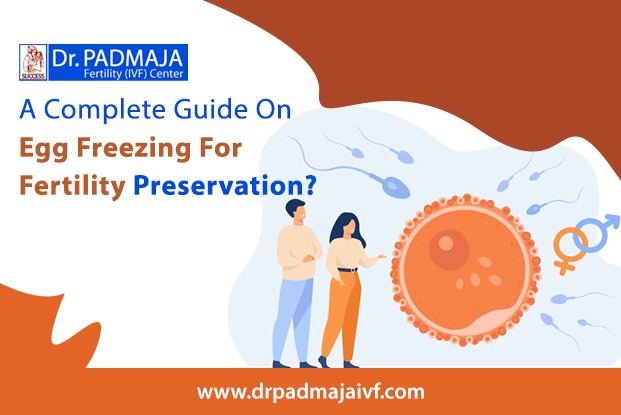In today’s world, many women are choosing to delay motherhood for personal, professional, or medical reasons. As a result, egg freezing—also known as oocyte cryopreservation—has emerged as a popular and reliable method for fertility preservation. Whether you’re planning to pursue higher education, focus on your career, or manage a medical condition, egg freezing gives you the chance to conceive when the time is right for you.
At Dr Padmaja IVF Center, one of the best IVF centers in Hyderabad, women are empowered with the latest reproductive technologies to help secure their future fertility. This guide will walk you through everything you need to know about egg freezing, its process, benefits, and why it might be the right choice for you.
What is Egg Freezing?
The process of extracting a woman’s eggs from her ovaries, freezing them, and storing them for later use is known as egg freezing. These eggs can later be thawed, fertilized with sperm, and implanted in the uterus through IVF (in vitro fertilization). Preserving fertility at an earlier age, when egg quality and quantity are at their best, is the main objective.
Delayed Parenthood: Personal or career goals may take priority, and egg freezing ensures future fertility isn’t compromised.
Medical Reasons: Treatments like chemotherapy or radiation can harm fertility. One proactive option for patients receiving such treatments is egg freezing.
Family Planning: To leave their options open for the future, women who haven’t found the appropriate spouse yet may decide to freeze their eggs.
Genetic Conditions: Some women with a family history of early menopause or genetic disorders affecting fertility may want to preserve their eggs early on.
The Egg Freezing Process
At leading clinics like the DrPadmaja Fertility Center, the egg freezing process is handled with the highest level of care and precision. Here’s a step-by-step overview:
Your fertility doctor will examine your medical history, conduct tests, and determine whether egg freezing is a good option for you at your initial consultation.
Ovarian Stimulation: To encourage the ovaries to generate more eggs, you will receive hormone injections over the course of 8–14 days.
Egg Retrieval: Once the eggs are mature, they are collected through a minimally invasive procedure under sedation.
Freezing: To preserve the eggs during the freezing and thawing procedure, the recovered eggs are frozen using a technique known as vitrification.
When is the Best Time to Freeze Eggs?
Therefore, fertility experts often recommend that women consider freezing their eggs in their late 20s to early 30s for the best results. However, even women in their late 30s may benefit from the procedure, depending on their overall reproductive health.
At Dr Padmaja IVF Center, fertility assessments are conducted to determine your egg reserve and hormone levels before recommending egg freezing. Every woman is guaranteed to make the best decision for her reproductive journey thanks to our individualized approach.
Success Rates and Considerations
The age of the lady at the time of freezing and the quantity of eggs recovered have a significant impact on egg freezing success rates. Younger women typically have better success rates since their eggs are of higher quality. It’s also important to note that not all frozen eggs will survive the thawing process or result in a successful pregnancy.
That’s why choosing the best IVF center in Hyderabad, like DrPadmaja Fertility Center, makes a significant difference. Their advanced lab techniques, experienced embryologists, and compassionate care increase your chances of a successful outcome.
Why Choose Dr Padmaja IVF Center for Egg Freezing?
If you’re considering egg freezing in Hyderabad, Dr Padmaja IVF Center stands out for its exceptional expertise, state-of-the-art facilities, and patient-first approach. Here’s what makes them a top choice:
Comprehensive Care: From initial consultation to egg retrieval and storage, the clinic offers end-to-end fertility preservation services.
Team of Experts: Under the direction of Dr. Padmaja, the facility employs skilled embaryologists and fertility specialists.
High Success Rates: The center is known for its excellent track record in IVF and fertility preservation treatments.
Personalized Treatment Plans: Every patient receives a customized plan based on their medical profile and fertility goals.
Final Thoughts
Egg freezing is more than just a medical procedure—it’s a way of giving yourself options and peace of mind. If you’re not ready for pregnancy now but want to keep the door open for the future, egg freezing might be the right step for you.
The journey may seem overwhelming, but with expert guidance from the DrPadmaja Fertility Center, you’ll be in safe hands every step of the way. Their compassionate approach and cutting-edge techniques have helped countless women take control of their fertility and future.
Take the first step toward fertility preservation today—your future self will thank you.
About the Author

This blog is penned by a devoted content specialist passionate about raising awareness around fertility treatments and emotional well- being. With in- depth disquisition on motifs like IVF and fertility, the thing is to give precious perceptivity for couples on their trip to parenthood.
Frequently Asked Questions (FAQs)
- What is egg freezing?
Egg freezing, also known as oocyte cryopreservation, is a method of preserving a woman’s eggs (oocytes) for future use. The eggs are retrieved, frozen, and stored so they can be fertilized later when the woman is ready to become pregnant.
2. What is the ideal age to freeze eggs?
The best time to freeze eggs is during your 20s to early 30s, as egg quality and quantity decline with age. However, many women still successfully freeze eggs in their mid-to-late 30s.
3. How long can frozen eggs be stored?
Frozen eggs can be stored for many years—typically 10+ years or more—with no significant decline in quality, thanks to advanced freezing techniques.
- Is egg freezing safe?
Yes, egg freezing is generally safe. Risks are minimal but may include mild side effects from hormone injections or complications during egg retrieval. It does not impact future fertility or menstrual cycles.
- How many eggs should I freeze for a good chance at pregnancy?
Doctors usually recommend freezing 10–20 eggs, depending on your age and fertility health, to increase the chances of a successful future pregnancy.
- Can frozen eggs guarantee a future pregnancy?
No, while egg freezing significantly improves the chances of future pregnancy, it does not guarantee it. Success depends on egg quality, age at freezing, and overall reproductive health.

